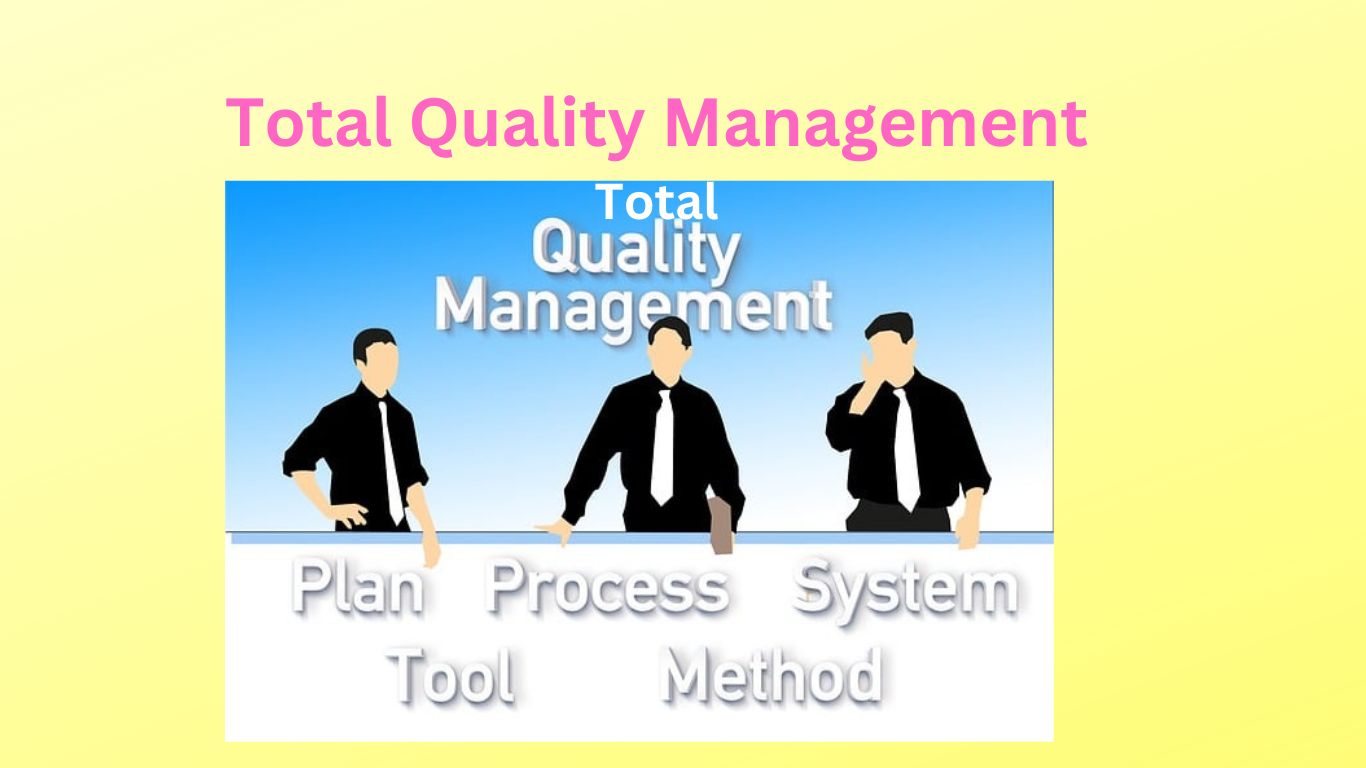Total Quality Management (TQM) is a management approach that seeks to optimize the quality of an organization’s products and services by involving all employees in a continual improvement process. It aims to increase customer satisfaction, reduce waste, and improve efficiency by promoting a culture of quality and teamwork.

TQM involves using quality-focused strategies and methods to manage all organizational processes, from product design and development to customer service. The goal of TQM is to continuously improve the quality of products and services, meet or exceed customer expectations, and reduce costs by eliminating waste and improving efficiency.
TQM also places a strong emphasis on leadership, employee involvement, and teamwork to create a culture of quality throughout the organization. Key elements of TQM include customer focus, continuous improvement, employee involvement, and a systematic approach to management.
Why Total Quality Management is important:
Total Quality Management (TQM) is important for many reasons as below:
- TQM helps organizations to understand and meet customer needs and expectations. It leads to increased customer satisfaction and loyalty.
- TQM helps organizations identify and eliminate waste and inefficiencies in their processes. It leads to increased efficiency and reduced costs.
- By continuously improving quality, organizations can differentiate themselves from their competitors and gain a competitive advantage in the marketplace.
- TQM places a strong emphasis on employee involvement, which can lead to increased motivation, job satisfaction, and commitment to quality.
- TQM promotes a culture of continual improvement, encouraging organizations to continuously seek out new ways to improve their products, services, and processes.
Overall, TQM helps organizations to achieve their goals and improve their bottom line by focusing on quality, customer satisfaction, and continuous improvement.
How does Total Quality Management work?
Total Quality Management (TQM) works by following a systematic and structured approach to quality improvement that involves all employees in the organization. TQM typically involves the following steps:
- The first step is to clearly define the quality expectations and standards for the organization’s products and services.
- The organization must have a system in place to measure its performance against the defined quality standards.
- The data collected from performance measurements is analyzed to identify areas for improvement.
- Based on the analysis of data, the organization identifies and implements improvements to its processes.
- The organization must continuously monitor and control its processes to ensure that quality improvements are sustained and that new problems do not arise.
- TQM encourages organizations to continuously seek out new ways to improve quality and to regularly review and update their quality systems.
TQM requires a commitment from senior management to create a culture of quality and to provide the resources and support necessary for continuous improvement. It also requires active involvement from all employees to identify and resolve quality problems and to participate in quality improvement efforts.
You may like to read about: What are the benefits of 7QC Tools in the manufacturing industry?
Principles of Total Quality Management (TQM):
- TQM places the customer at the center of all quality-related activities and decisions, to meet or exceed customer expectations.
- TQM requires strong leadership from senior management to create a culture of quality and to provide the resources and support necessary for continuous improvement.
- All employees must be actively involved in the quality improvement process and have a sense of ownership for quality.
- TQM promotes a culture of continual improvement, encouraging organizations to continuously seek out new ways to improve their products, services, and processes.
- TQM focuses on improving processes rather than just individual tasks, with the goal of improving the overall efficiency and effectiveness of the organization.
- TQM relies on data and facts to make decisions and evaluate progress, rather than intuition or personal opinions.
- TQM adopts a systematic approach to managing quality, treating it as an integral part of all organizational processes.
- TQM recognizes the importance of working closely with suppliers to achieve common quality goals.
By following these principles, organizations can continuously improve the quality of their products and services, increase customer satisfaction, and achieve a competitive advantage in the marketplace.
Total Quality Management Examples:
Examples of organizations that have implemented Total Quality Management (TQM) are:
Toyota Motor Corporation: One of the most well-known examples of TQM, Toyota is widely regarded as a pioneer of the TQM approach.
Motorola: Motorola’s TQM program helped the company achieve significant improvements in quality and productivity, leading to increased competitiveness and customer satisfaction.
Deming Prize Winners: The Deming Prize, named after W. Edwards Deming, is awarded annually to organizations that have demonstrated excellence in TQM. Past winners include companies from a variety of industries, including manufacturing, healthcare, and government.
GE Appliances: GE Appliances used TQM to improve the quality and efficiency of its manufacturing processes, leading to increased competitiveness and customer satisfaction.
Marriott International: Marriott International adopted TQM to improve the quality of its services and customer experience, leading to increased customer satisfaction and loyalty.
These organizations serve as examples of how TQM can be successfully implemented to achieve significant improvements in quality, customer satisfaction, and competitiveness.

